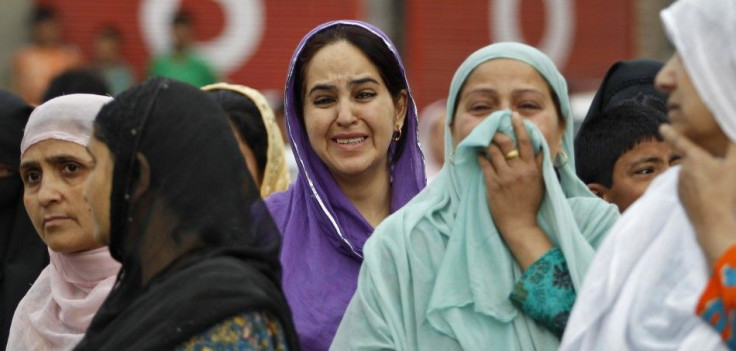Kashmir Womens’ Health Deteriorating: Is The Military Conflict To Blame?

Decades of military conflict, insurgency, forced disappearances, cross-border attacks and terrorism have apparently gravely damaged the physical and mental health of women in Kashmir, the Himalayan state claimed by both India and Pakistan.
According to a report in Dawn, the English-language Pakistani daily newspaper, high rates of infertility and stress have been discovered in the region.
However, the real reason behind this spike in illnesses among women remains a mystery.
A teenage girl named Maleeha, in a clinic in the city of Srinagar, found out she has severe polycystic ovarian syndrome, or PCOS, an endocrine disorder that is one of the leading causes of infertility.
“I am extremely worried about this problem as it is known to cause infertility,” she told Dawn.
Another patient, Andleeb, also suffers from infertility.
“I have got every test done, but the doctors have not been able to find the reason for my inability to bear children. It has ruined my life,” she said.
Doctors in the region are seriously concerned.
“The number of patients diagnosed with PCOS is adding with each day,” gynecologist Dr. Sameena said.
Up to 70 percent of the women diagnosed with PCOS are suffering from mental illnesses, including depression, Dawn noted.
Dr. Farhat Hameed, a local gynecologist, attributes the spike in infertility to, among other factors, late marriages, hormonal imbalance, unhealthy lifestyles and stress.
“The marital age for Kashmiri women has risen from 18-21 to 27-35 years. Girls prefer quality education and a good career before marriage. This has affected their child-bearing capacity,” Dr Hameed stated.
In-vitro fertilization, or IVF, clinics -- something brand new in Kashmir -- remain financially prohibitive to the vast majority of the local population.
“My husband is a clerk and does not earn much,” a woman named Afsana said. “We cannot afford IVF or similar treatments. I am reconciled to not having a child.”
The numbers are stark.
The Sher-e-Kashmir Institute of Medical Science, or SKIMS, reported in a study that 15.7 percent of Kashmiri women of childbearing age will never give birth without the aid of clinical intervention (which most cannot afford). Another 14 percent of women simply cannot conceive due to “unknown medical conditions.”
This means that almost one-third of Kashmiri women may remain childless their whole lives.
The constant state of warfare and violence in Kashmir has also coincided with huge numbers of people suffering from various mental disorders.
“Conflict has resulted in many psychiatric problems in women, including depression, post traumatic stress disorder, or PTSD, and anxiety, which directly affect child-birth,” Dr. Hameed added.
Research suggests 10 percent of Kashmiri women and even teens are afflicted with PTSD.
PTSD has also led to a high rate of miscarriages among Kashmiri women, according to a 2006 study by Doctors Without Borders.
In addition, cases of hypertension and orthopedic problems have also arisen.
Such illnesses were virtually unknown in Kashmir as recently as a generation ago.
Worsening the problem are the attitudes of this extremely conservative society against such Western conventions as childlessness and mental illness.
“Not a day passes when I don’t face abuse from my husband and in-laws for not bearing children,” a childless woman named Saima said.
“For me, the torture is two-fold. I am trying the best medication and doctors, but the rest is in God’s hands. Why should women be blamed for it?”
Another childless woman named Hussain told Women’s News, "An infertile woman is generally viewed as incomplete with a notion of having a curse bestowed for some misdeed.”
Kashmir has become a kind of proxy war between India and Pakistan for decades, resulting in tens of thousands of deaths and enforced disappearances, as well as accusations of torture committed by the militaries of both South Asian giants.
Since an insurgency erupted in 1989, at least 40,000 -- perhaps as many as 80,000 -- people have been killed, about half of them civilians.
India and Pakistan have already waged three wars over Kashmir since 1947, raising fears that the next such confrontation could involve nuclear weapons.
© Copyright IBTimes 2025. All rights reserved.





















